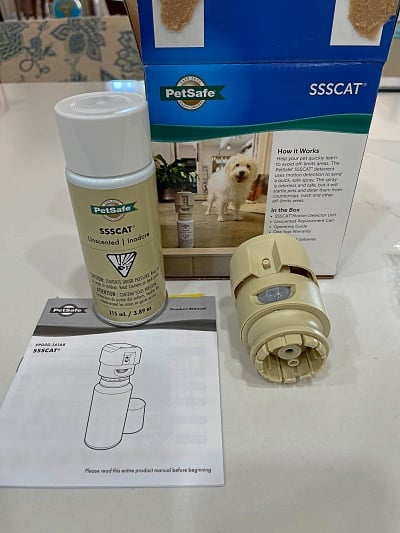Have you ever tried to keep your cat off your bed or out of a room? Tired of trying to them out of your bedroom without closing the door? Even if you close AND lock the doors, their scratching and meowing may become unbearable after a short time. So what do you do? As fellow cat parents, we’ve tried and tested ways to keep your cat away while keeping them happy.
In this article you’ll learn how to keep cats off your bed, how to keep them out your bedroom with 4 proven ways, and the 6 steps to train them to keep off your bed and out of your bedroom.

Table of Contents
Can I keep my cat out of my bedroom?
Yes ! With the right deterrents and training it is possible. Many a cat owner (us included) want to keep our feline friends out of a specific room. Yes, we love our cats. We also need our sleep and privacy too. Like you, we don’t want them bothering us while we are trying to sleep, especially when they decide they want to eat at 4 a.m.
In many cases, like if you have allergies, you may reduce your allergy symptoms by keeping your bedroom free of cats and most specifically cat hair. Babies rooms and kitchens are also spaces where many people would like to keep kitty free.
So how do you keep them out of your bedroom? Your pet likely wants to be with you and doesn’t understand how you could possibly not want to be with them. So how do you do this and what are the downsides of this?
Affiliate disclosure:
The following contains affiliate links. As an Amazon Associate I earn a small commision from qualifying purchases. This is used for keeping the blog up and running smoothly. Please know this does not change the price you see on Amazon. Thank you for your help and support of Pet-Happy!
If you don’t have Amazon Prime, we highly recommend trying it. The biggest benefit is free shipping. Yes, free ! You can also get your orders in 1,2, and even same day along with 2 hour grocery delivery. One of our favorites is the free movies and TV shows on Amazon Prime. There are so many more benefits. To find out yourself, you can try Amazon Prime free for 30 days. If you have a Kindle and love reading like we do, you can also try Kindle Unlimited free for 30 days.
Keeping your cat out of the room without unnecessary stress
Some say that keeping a cat out of certain areas isn’t possible unless a human is present to give a negative cue. This means that shooing them, making a loud noise, or punishing them by spraying them with a spray bottle is needed. While that may keep your indoor cat out of a certain area of the house, they may connect you with those negative actions. That’s not what you want. Why?
The problem is that negative reinforcement always includes stress for your cat. Punishing your cat may make them fearful of you. Worse, negative training actions (like a squirt from a spray bottle) from you may trigger other unwanted negative behaviors, such as urine spraying, litter box avoidance, kicking kitty litter everywhere, and just going nuts. So what can you do?
How do I keep my cat off my bed and out of a room: 4 proven ways
There are several humane ways for to keep your cat (or dog) away from a certain area that doesn’t associate the unpleasant event with you and won’t trigger bad behaviors. They’ll teach your pets where they shouldn’t go while preserving your loving relationship:
1. Electronic cat repellents
This is the number 1 proven way to teach your pet to avoid an area. These 2 products (SSSCat and PetSafe ScatMat) are what we recommend to our pet owner patients. We have found they produce the best results and the feedback from our patients is that they work well for them too. The other 3 below work, but not nearly as well.


This pet training aid sprays a stream of air whenever your pet approaches it. You put it on the floor of whatever you are trying to prevent them from going. When your pet approaches, the device’s motion detector senses them and releases a burst of air. This doesn’t hurt your cat (or dog) but they won’t like it. It surprises them and forces them to retreat. Yes, it works every single time. And for all but one of our cats, it only took one encounter. You can check out the reviews and it here. Here’s our in depth look that we purchased. We use this in our own home and our veterinary clinic. They work from about 3 feet away, have an adjustable nozzle (up, straight, and down), and best of all, replaceable air canisters. They work great to keep our feline friends off our kitchen countertops and our bed at night. Another electronic pet repellent is the PetSafe ScatMat.

Electronic mats are what we’ve found work very well. They come in various sizes, are battery powered (9 volt battery but it’s not included like the 4 AAA batteries that came with the sssCat), have 3 levels of static pulse that discourage your pet from that area, and come with a 1 year warranty. They have 9 settings of correction. 3 levels of Tone only (it’s a beep which isn’t that loud, but your pets will definitely hear it), 3 levels of static pulse, and 3 levels of tone and static pulse. We found that starting with just the tone first may work for kittens or skittish kitties. If you have a kitten, the first level of static pulse works well. Our older dogs and cats needed the medium and high setting as their pads are a lot tougher. Your cat (or cats) will associate the area with that funny feeling under their paws and will stay away. We found the Medium sized one was big enough to keep them away from the door. We also put them on our bed to keep our pets off of it. This has really helped our allergic reaction to their dander and our asthma. Once trained, you can use this mat in other areas of your home like your couch or favorite chair. We put these in front of our bedroom door and our cats stopped scratching the door all night. We also have them on our couches to keep our dogs off of them. It helps reduce the amount of pet hair we have on us at all times. The picture from Amazon shows them as white, but they are pretty clear and you can see the little wires inside.

The PetSafe ScatMat Indoor Pet Training Mat (30×16) safely teaches your pet which areas and pieces of furniture in your home are off-limits. We found that uses both the sssCat and ScatMat together worked perfectly to teach our cats and dogs where in the house to stay away from. As you know, our pets are very smart and figured it out very quickly. Even our most curious kitty stayed away when they encountered the secondary barrier (spray and mat together).
ScatMat What’s In The Box
I purchased a new one that I needed and here’s what it looks like. It kinda looks like a clear plastic runner liner, but with wires in it:




2. Spray on repellents
These are chemicals that are supposed to be something that indoor kitties don’t like. They can be applied on the doorway of your bedroom or the room that you are trying to prevent access to. These commercial spray repellents usually emit a scent that is unpleasant to your pet’s nose. Many use vinegar as the smell of vinegar isn’t the most pleasant. The trouble with these types of repellents is that cats usually ignore them. We found our feline friends avoided the area for a short while. Once the smells faded a little, they ignored it. The various ones we tried failed to keep our cats off furniture or bed. To remain effective, they must be reapplied frequently. Check the label for proper usage.
3. Citrus rinds
We have also tried placing citrus fruit rinds (some say peels) at the door of our bedroom and even sprinkled them on our bed as citrus is one of the scents cats hate. They do work because your cats sense of smell is so much better than ours. Our cats really didn’t care for the strong smell of citrus. The problem we had is they dry out in less than a day so you will need to eat tons of oranges and lemons. Oddly, the biggest downside was they always prompted weird questions from people visiting.
4. Other cat repellents
We have heard and tried many other cat repellents. Some are funny, some are scary, but most of them just don’t work. We tried a physical barrier like baby gates and a pet gate. Our cats cleared them in one jump. If you are curious, learn how high cats jump. Gates work well with our dogs as we barrier trained them when they were puppies. We did this by letting them get close to it and then tipping it over. The noise scared them so they don’t go near them. Our cats? They couldn’t care less, they just jumped right over them. One of our patients asked “What about a plastic mat with loaded mouse traps underneath it?”. We tried not to laugh. What about placing aluminum foil, sticky tape, or double-sided tape at the entrance to a room or on furniture? Our cat actually decided he wanted to play with the sheet of tin foil in the middle of the night. He liked it better than his cat toys. We found a pile of it on the top of our cat condos. To prevent your cat from jumping over the foil or tape, you could cover your bed with aluminum foil. That would definitely keep your pets off, but would be quite a mess and tough to deal with at bed time. We even tried sprinkling cayenne pepper on our bed to keep them off. All it did was make us sneeze all night. Our cats didn’t care. If you are interested, you can find more ways to deter cats here.
6 Steps to train your cat to keep out of a room
Now that you are familiar with most common pet repellents, here is our step-by-step procedure for training (yes, training) your cat (and dog) to keep off of your bed and not to enter a room:
1. Patience is a key
Rome wasn’t built in a day and training isn’t going to happen overnight. Your cat is a nocturnal animal and their learning to stay away from an area or thing will likely happen when you are asleep. Trying the above 4 ways will produce results, but your pet may figure out ways around them. Don’t shout or throw things at your cat. They may be stressed already and you don’t want to add to that stress. Follow all of the steps below, and be patient.
2. Set up the cat repellent
Then leave. Maybe set up an old phone as a security cam so you can watch how your cat interacts with the repellent. Training is most effective when you aren’t around. Ideally the correction occurs when you aren’t in the area as we’ve talked about.
3. Redirect your cat’s attention
This of course, is possible only when you are present. If you see your cat approaching the unwanted room, call them to you. If they don’t respond, try throwing a toy in the opposite direction, drop a piece of food or kibble, or scratch the floor to get your cat’s attention.
4. Reward your cat if they respond
Praise and give them a treat when they come to you. Offer them their favorite treat. You know what your cat likes most so use whatever that is. For one of our cats, he liked the area above his tail to be scratched. For another, she loved a little bite of sausage.
5. Enrich the environment in all the other rooms
Make the rooms your feline friend and puppy are allowed to be in more attractive. There are plenty of ways to do this. Mental stimulation is something your pet will benefit from. Create several perches above the ground level (cat tree, cat shelves, window perches) to expand their vertical space. Create a hiding spot (boxes, niches, cat houses), introduce interactive objects (puzzle feeders, a scratching post, cat toys), and position them near a window with an outdoor view. All these modifications will improve your cat’s life and reduce their stress. At some point, the rest of your house may become so much fun for your cat that they don’t need to enter the undesired room because it’s not as much fun, even without a deterrent.
6. Entertain your pet
This is the hardest step for most owners. It requires playing, petting, grooming, kibble hunting, and other activities. The hardest part is that you are required to do it every day not just during the training period but for the rest of your cat’s life. Every cat will benefit from regular playing and other activities regardless of whether their owner is or isn’t trying to keep them away from something. It’s really hard work, we know. Some might ask, can I skip it? Our answer would be yes.
In order to keep your cat off your bed and out of your room, it’s not necessary to do all the things listed above. We found a good deterrent alone will work well enough like the sssCat and ScatMat. These two combined work wonders.
You’ve learned how to keep cats off your bed, how to keep them out your bedroom with 4 proven, and the 6 steps to train them to keep off your bed and out of your bedroom. These steps are necessary to keep your pet away from a certain area or thing while making sure they are happy, behaving well, and healthy. You’ll be happier by getting better sleep and your pets will be happier too. And keeping your Pet Happy is what we all want.
